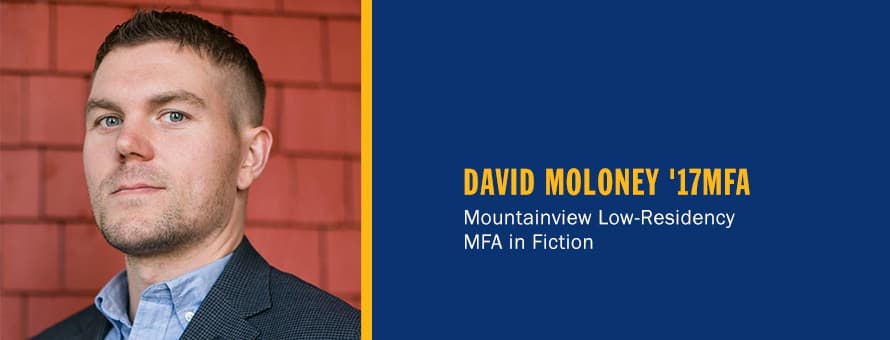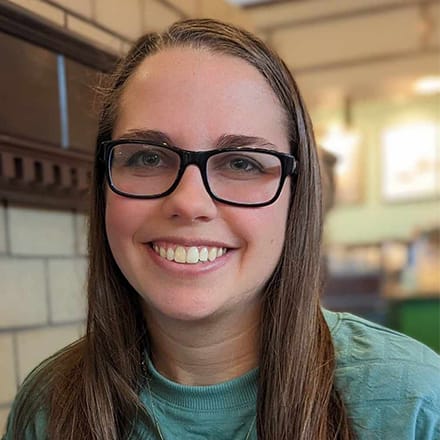MFA Alumnus’ Debut Novel Released by Major Independent Publisher

When David Moloney ’17MFA started writing “Barker House” in the first semester of his MFA program, he didn’t think it would ever be published. By the end, he was querying agents. Although it took a bit of time and rejection, his debut novel was released by Bloomsbury Publishing this month.
Ahead of its release, the Mountainview Low-Residency MFA alumnus shared his writing process, the road to publication, what inspires him as a writer and more in this Q&A.
Have you always written?
I have not. Storytelling, though, is something I’ve always done. I was a bit of an exaggerator as a kid, always hyperbolic in my tales. Werewolves outside my bedroom window, that kind of stuff. Elaborate storylines found their way into my roleplaying with G.I. Joes, or while we played Manhunt in the woods.
I didn’t start writing until high school when I took a creative writing class. I’d write short stories on scrap paper in class and then read them to my friends while we drank in the woods. They may have only humored me while I read to them, but I hope they have a nostalgia for those pre-cell phone nights of cheap beer and badly written tales.
What’s your process in developing your storyline and characters?
I start with character, always. If I can’t find their voice or feel during the first paragraph, I create a separate character sketch, an exercise I do with my students. I make a list of their memories: first kiss, what their parent’s car smelled like, the time in their life they felt they were going to die, happiest moment, most embarrassing moment. I give them a history: jobs, scars, residences, schooling. Maybe none of it makes it into the story, but I need to know them.
Storyline is different. This might come to me after I’ve created the character, or while I am creating (the) character. I want to be surprised by my plot. I write towards conflict; characters in trouble make for (a) good story. Once I’ve figured out the trouble, or the desire to enter or avoid the conflict, then the story becomes clearer to me.
What challenges do you face in your writing, and how do you overcome them?
I’ve never had writer’s block. My absence of writing happens because life is in the way. If things were perfect, I’d have my morning black coffee, sit at my kitchen table, and write until lunch. But I can’t do that. So, I make my writing work within the confines of my other responsibilities. Writing cannot be first on the list, but it certainly cannot be the last. If I get 500 words in, four days a week, I am happy. If, say, words are not coming in a session, I stop writing, and I pick up a book. It won’t take more than a few pages before I’m back at the keyboard.
What has the road to publication been like for you?
 I wrote a draft of the book in nine months, the first two semesters of my MFA. I spent the third semester revising, and then I queried agents. I went the traditional route. I secured an agent, one that was excited about my writing, and we spent a year together making the book ready for submission. Once it was, my agent sent it to a round of the big houses and their imprints. We had a few rejections, and then it got quiet. We sent out a round two, and a few were interested quickly. Bloomsbury had the best offer and what I felt the best vision for the book.
I wrote a draft of the book in nine months, the first two semesters of my MFA. I spent the third semester revising, and then I queried agents. I went the traditional route. I secured an agent, one that was excited about my writing, and we spent a year together making the book ready for submission. Once it was, my agent sent it to a round of the big houses and their imprints. We had a few rejections, and then it got quiet. We sent out a round two, and a few were interested quickly. Bloomsbury had the best offer and what I felt the best vision for the book.
How did it feel to have your novel picked up by such a notable publisher?
I was surprised. While writing the book, I honestly never thought it’d be published. I think that was what was so fun and freeing while writing it. I was writing to no audience. It was just what felt true to the characters and the story. One afternoon, I was running on the treadmill at the gym, and my agent called. She told me Bloomsbury was interested, and I don’t think I turned the treadmill off.
How do you market your work?
I have a publicist at Bloomsbury. She has been great – set-up the book tour, all the press. This is why I try to push my friends and students toward traditional publishing. You have an entire village working on making your book a success: agent, their legal team, foreign rights division, an editor, a copyeditor, a freelance copyeditor (for fresh eyes), a publicist, marketing. I do some social media, but I am reluctant to do so. It feels icky. I want my work to speak for itself and let the people who know what they’re doing push it out into the world.
What do you wish you knew when you first started writing?
That writing a book is the hardest thing I’ll ever do. But to still see it through. And then do it again.
Persuade someone to read “Barker House” in 50 words or less.
If you are at all interested in the broken criminal justice system in this country, read this book. If you’ve ever wondered what happens behind the secured doors of a jail or prison, out of the public’s view, read this book. If you are expecting “Orange Is the New Black,” look elsewhere.
Who are the authors that have inspired you most, and how have they inspired you?
Andre Dubus III, my mentor, taught me how to go deeper. To ask myself what it is really like to be the characters I am writing.
Tim O’Brien’s writing inspired me to be honest in my stories, but not too honest.
If you could keep just three books in your library, which would you choose and why?
- “Jesus’ Son” by Denis Johnson. It messes me all up in good ways every single time I read it.
- “Twenty Grand” by Rebecca Curtis. Whenever I am stuck on a story or uninspired, I read that collection.
- “Salvage the Bones” by Jesmyn Ward. It is the most beautiful book I have ever read. The prose, the imagery, the harshness, the desolation after Katrina -- it captures the human spirit in ways I can only aspire to in my fiction. That novel is a true masterpiece.
Rebecca LeBoeuf ’18 is a staff writer at Southern New Hampshire University. Connect with her on LinkedIn.
Explore more content like this article

What is a Liberal Arts Degree and What Can You Do With It?

Academic Spotlight: Dr. Carole Beauchemin, Executive Director of Global Campus Academic Strategy

What Can You Do With an English Degree?
About Southern New Hampshire University

SNHU is a nonprofit, accredited university with a mission to make high-quality education more accessible and affordable for everyone.
Founded in 1932, and online since 1995, we’ve helped countless students reach their goals with flexible, career-focused programs. Our 300-acre campus in Manchester, NH is home to over 3,000 students, and we serve over 135,000 students online. Visit our about SNHU page to learn more about our mission, accreditations, leadership team, national recognitions and awards.


